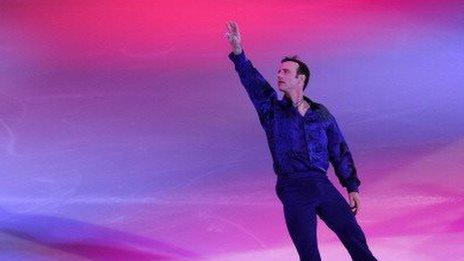Brian Boitano puts gay male athletes in the Sochi spotlight
- Published
- comments

Brian Boitano becomes the first openly gay man in the 2014 US Olympic delegation
President Barack Obama made headlines earlier this week when he named two openly gay athletes, tennis star Billie Jean King and hockey player Caitlin Cahow, to join the US delegation to the Winter Olympics in Sochi, Russia. Now, there is a third - gold-medal-winning figure skater Brian Boitano.
In a statement provided to USA Today, external, Boitano said: "I am many things: a son, a brother, and uncle, a friend, an athlete, a cook, an author, and being gay is just one part of who I am."
Mr Obama's choice of King and Cahow had been viewed as a riposte to Russia's crackdown on gay rights under President Vladimir Putin.
"What better way to show the nation's disgust for President Vladimir Putin's anti-gay propaganda law than for Obama to send an American cultural icon and sports legend who also happens to be openly gay?" writes, external sports columnist Christine Brennan.
His decision not to name an openly gay man to the delegation, however, was criticised, external by Kavitha A Davidson in Bloomberg View.
"This stems from the double standard for men and women, and isn't just an issue of straight or gay," she writes. "Heteronormative notions of gender traits and roles advance the view that gay men, considered 'feminine,' have no place in the hypermasculine arena of athletic competition. On the other hand, the stereotype of the butch lesbian lends itself to pseudo-acceptance, which may seem like progress, but is really just the old tune in a new key. If straight women are too girly and thus too fragile to play sports, gay women aren't because they aren't really women."
A day before Boitano's announcement, footballer Robbie Rogers told, external the BBC's Jeremy Paxman how hard it was to come out of the closet as a professional athlete. "My biggest fear was going back into a locker room and the thought of being treated as an outcast," the American, who currently plays for LA Galaxy, said.
After initially being reluctant to work as a gay rights advocate, he said he now feels he has a responsibility to help create an environment that will make it easier for athletes to come out of the closet.
Boitano, it appears, is feeling the same pull.
In 1968, the civil rights struggle took centre stage during the Mexico City Olympics, when US athletes John Carlos and Tommie Smith lowered their heads and raised their black-glove-clad fists in a black power salute while on the awards platform.
Will the Sochi Olympics present a similar moment for the gay rights movement?